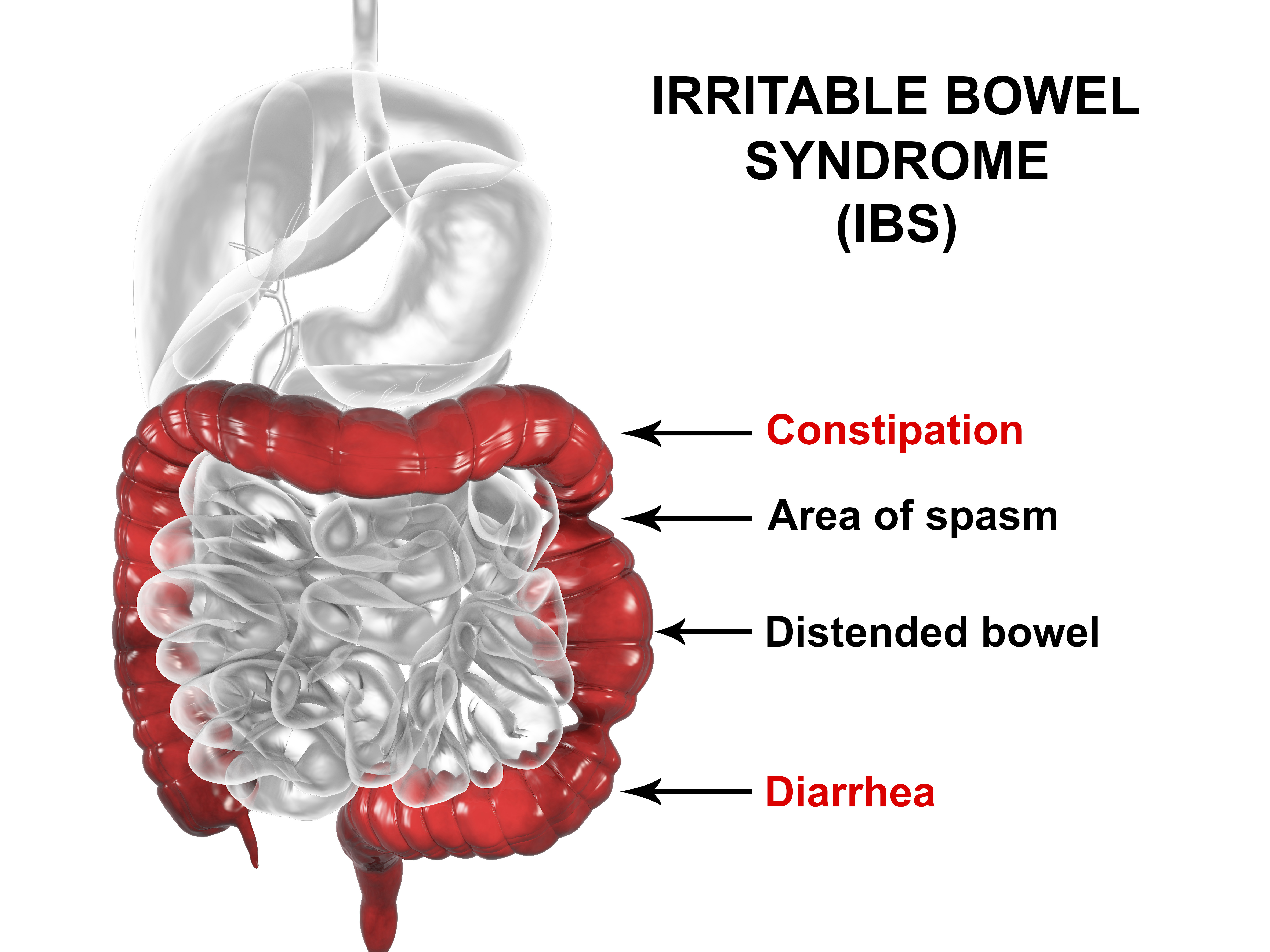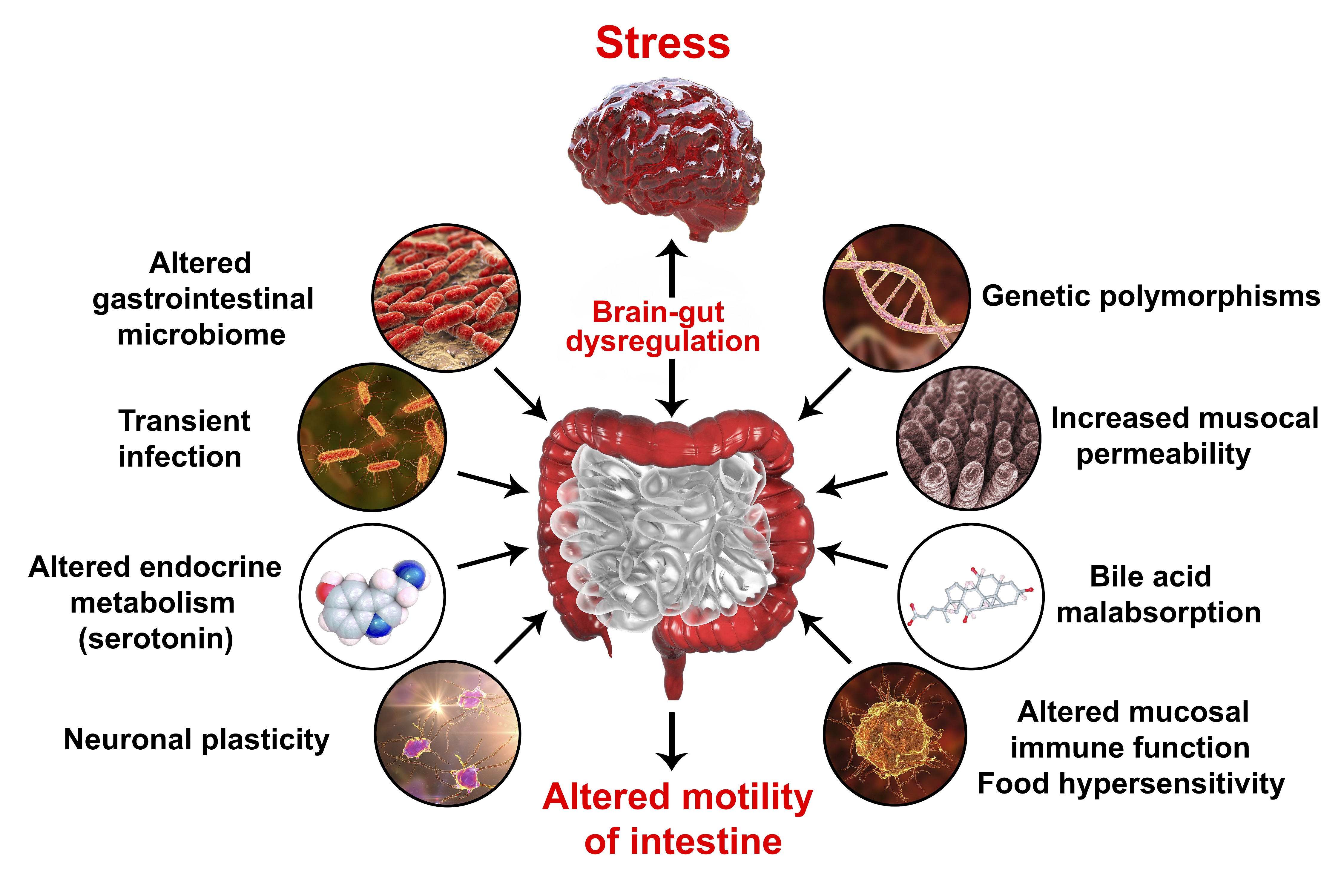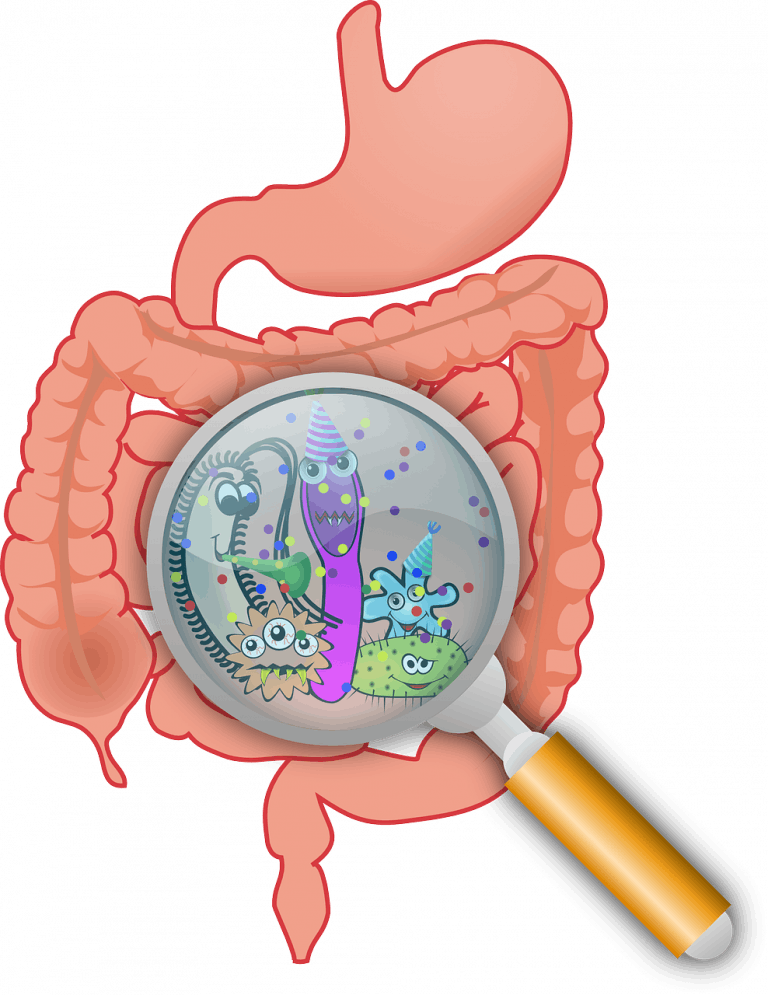The topic of SIBO, or bacterial overgrowth syndrome in the small intestine, is more and more widely present in both medical literature and available for all Internet sources. According to research, SIBO is responsible for even over 80% of diagnoses of irritable bowel syndrome. There are many myths around it that result not only from the complicated nature of the disease and the still relatively small knowledge about it, but also from the extremely different approaches of various specialists. Both patients, especially fledgling in the topic, as well as specialists who do not closely follow gastroenterological novelties, find it difficult to find information on it. Therefore, especially for them, this mini-guide was created.
1. What is SIBO?
Let's start with the definition. SIBO is an over-normative multiplication of bacteria and archaea in the small intestine. It arises as a result of disturbing the MMC (migrating motor complex), i.e. the wandering myoelectric complex. MMC is the electrical activity of the digestive system, which occurs during fasting, i.e. between the digestive cycles (in contrast to peristalsis, the activity of which begins with swallowing the first bite of a meal).
When MMC is not working properly, food remains are not properly removed from the small intestine and are metabolized by the microorganisms that live there. Thanks to easily available food and the fact that their excess is also not removed, they can easily reproduce and comfortably live. The metabolites of these bacteria are primarily hydrogen, hydrogen sulphide and methane, which are the direct cause of the symptoms that affect patients.
2. Symptoms

SIBO symptoms include primarily problems with the digestive system - permanent flatulence regardless of diet, irregularities of bowel movements (diarrhea, constipation, diarrhea and constipation), change of stool consistency, appearance of undigested remains or mucus, belching, reflux, abdominal pain as well as a negative reaction to foods rich in FODMAP (Fermentable Oligosaccharides, Disaccharides, Monosaccharides and Polyols).
As the state of our digestive system affects our entire body, some of the less specific systemic symptoms can also be included in SIBO symptoms. These are primarily the feeling of constant fatigue, cerebral fog, mood disorders and eating disorders, head and joint pain, rosacea, asthma and all other minor or major health problems that may be affected by nutrient deficiencies caused by SIBO.
Additional symptoms that should lead us to think are, among others, bad reaction to polypotoxic probiotics, FOS, GOS or inulin, difficulty in combining symptoms with specific consumed products, lack of improvement after using gluten-free diet in patients with celiac disease or improvement of well-being after accidental antibiotic therapy .
3. Reasons for SIBO
SIBO can be caused by three groups of factors
- Disturbed gastrointestinal motility (damage to the work of a migrating myoelectric complex). This is the most common reason for SIBO. It may be caused by bacterial intestinal infections (especially Campylobacter jejuni), borreliosis and yersiniosis, parasitic infections (especially Giardia lamblia), some medicines, especially from the group of proton pump inhibitors (IPP), diseases of the pancreas, liver and gall bladder, hypothyroidism, gastroparesis as well as autoimmune diseases, especially those located in the digestive system and having a direct impact on it (celiac disease, IBD, systemic sclerosis, Hashimoto's autoimmune thyroiditis). Elderly people are also exposed to the loss of MMC.
- Structural problems. It is mainly about adhesions as a result of surgery, endometriosis or inflammatory bowel diseases. These can also include diverticulosis, anatomical defects, cancerous tumors or the consequences of accidents.
- Immunodeficiency. This is a rare occurrence. They may be the result of congenital and acquired immunoglobin A deficiency, common variable immunodeficiency, chemotherapy and radiotherapy, AIDS or the use of immunosuppressive drugs (eg as a result of autoimmune diseases).
At this point I would like to mention the antibiotics and diet, which are also rightly and wrongly burdened with the creation of SIBO. Incorrect diet definitely weakens the functioning of the whole organism and can contribute to the formation of deficiencies and disorders of the intestinal microbiome and, consequently, serious diseases that predestinate the development of hypertrophy. Antibiotics, on the other hand, because they cause strong aberrations in the intestinal ecosystem, can contribute to the excessive multiplication of pathogenic bacteria that produce toxins (especially CdtB toxin) against which the body produces antibodies that may result myoelectric complex (vinulin). However, neither diet nor antibiotic therapy should be considered as the direct cause of SIBO, therefore the argument that SIBO should not be treated with antibiotics, because it is antibiotics that cause them, is misguided.

4. Diagnostics
How can we check if the cause of our intestinal problems is SIBO?
Firstly, it is wiseful to contact specialists, to let them guide you in SIBO treatment
- Respiratory tests. They are basically the only method available in Poland to diagnose SIBO. Medical technology allows to check the presence of hydrogen and methane in the exhaled air. They are made using lactulose, in some cases also glucose. The test consists of forcing the breath into a special pouch or device at 20-minute intervals for 3 hours. The test should be prepared using a proper diet. Hydrogen tests are more widely available, but with current capabilities they turn out to be incomplete and in most cases too broad for interpretation.
- Antibody against vinulin and CdtB toxin. This is a study that allows us to determine if SIBO is the result of an intestinal infection. However, this is a study not available in Poland. In Europe, they can be made in London.
- Other tests. The remaining tests allowing to diagnose SIBO include, first of all, aspirate culture, treated as the gold diagnostic standard. It consists in endoscopic retrieval of duodenal content and sowing it in laboratory conditions. However, this method is expensive and quite invasive, it also has its disadvantages, therefore it is a miracle to do it on your own. The second test worth noting is the study of organic acids in the urine. Has a chance to check with people who for various reasons are not able to blow (eg small children) and people who can not take the substrate or prepare for the breath test. However, its diagnostic effectiveness still needs to be verified. SIBO can not be diagnosed with colonoscopy, gastroscopy, intestinal microflora or stool cultures.
- Additional diagnostics. Depending on the case, we should also do other tests that will help us assess the state of the body and detect possible diseases, disorders and deficiencies. These are primarily basic blood, urine and faeces tests, microbiological tests, vitamins and minerals, autoimmune antibodies, inflammatory and cancer markers, as well as endoscopy of the digestive system.
5. Conventional treatment
The conventional treatment of bacterial overgrowth in the small intestine consists in the use of appropriate antibiotic therapy and possibly prescription prokinetics. These are most commonly rifaximin, neomycin and metronidazole. Often, however, other preparations appear also depending on other accompanying infections (e.g. Helicobacter pylori or Yersinia enterocolitica). The important thing is that in the case of SIBO conventional treatment does not stand in opposition to supplementation and phytotherapy. You can and even should use them together.
6. Herbal therapy and supplementation
Herbal supplements and medicines are also an important part of hypertrophy therapy, because they allow to broaden the spectrum of conventional drugs and safe extension of therapy. In the case of SIBO, however, all supplements should be used with moderation and caution and should be selected based on test results, food tolerance, medical history and previous treatment results as well as reactions to the substances being taken. There is no single course of action, but there are some groups of supplements that we should consider when planning a therapy. They are above all
- bactericidal substances (in the treatment of SIBO, the most important are alicine, i.e. garlic oil, oregano oil, berberine, neem),
- fungicides (e.g. caprylic acid or undecylenic acid),
- anti-biofilms (N-acetyl-cysteine, proteolytic enzymes),
- prokinetics (iberogast, ginger, 5HTP, others are the most common prescription drugs)
- probiotics(theoretically the safest are Bifidobacteria and non-pathogenic yeast Saccharomyces boulardii).
For the therapy to be complete, the patient should also be analyzed for disorders of work other than the gut of the digestive organs. Most often the support needs a stomach and liver. In the case of stomach, one should be particularly careful in the use of apple vinegar and betaine HCl, while in case of inflammation, aloe vera or licorice DGL is useful. The liver should be supported first of all by diet (liver!)). You can also use artichoke extract, dandelion or green tea, as well as phospholipids and N-acetyl-cysteine. In the later stages, supplementation should be implemented to supplement the deficiencies of vitamins and minerals (iron, zinc, magnesium and B vitamins), as well as therapy allowing the reconstruction of the intestinal mucus tightness (broths, l-glutamine, quercetin, are most important) butyric acid, extensive probiotic therapy). It is also necessary to take steps to remedy other diseases, as well as to stabilize the immune system and the autonomic nervous system.
7. Low FODMAP diet and SIBO Specific Diet
To get rid of SIBO, several additional elements of therapy should be considered. The first and most important of them is a proper diet, composed based on the patient's needs. Adjusting the diet should pay attention to the remaining diseases of the patient, individual reactions to the products, as well as other ailments of the digestive system that may determine, for example, the method of treatment and consistency of dishes. The psychological state of the patient, his current diet, as well as his taste preferences are also significant.
Typically, the optimal starting pattern for most cases is the Low FODMAP diet, i.e. the low content of fermentable oligosaccharides, disaccharides, monosaccharides and polyols. It is based on SIBO Specific Diet by Dr. Alison Siebecker and Bi-Phasic Diet Nirali Jacobi. However, other diets may also be checked (from GAPS and SCD, through the Mediterranean diet to Paleo, Samurai, and even in some situations vegan and vegetarian diets), provided they are adjusted to the patient's response.
8. Elemental diet
A specific treatment for hypertrophy is an elementary diet that is not actually a diet in the standard sense. It consists of 2-3 weeks of consumption of special mixtures with easily digestible forms of essential nutrients. Theoretically, it is very effective in the treatment of hypertrophy, in practice, however, not always, moreover, it is difficult to maintain.
9. Additional elements of therapy
When we are dealing with hypertrophy, we should be aware that the balance of not only the digestive tract, but the whole organism has been disturbed. Therefore, not only drugs, supplements and diet will have causative power. We should also pay attention to the environment in which we live, especially for the part that we are influenced by, that is, the cosmetics we choose, the products we buy, what is important to us in our life and how we fill our time. Depending on the case, it is worth supporting the body with slightly different sides, for example, aromatherapy, visceral massage and appropriate physical activity. It is also necessary to pay attention to our mental state and the people we surround ourselves with. A very important element of the whole therapy is also the patient's cooperation with the doctor, because antibiotic therapy and the use of drugs affecting the intestinal nervous system requires the supervision of a specialist.
References:
https://www.ncbi.nlm.nih.gov/pmc/articles/PMC4030608
https://www.ncbi.nlm.nih.gov/PubMed/15316000
https://www.ncbi.nlm.nih.gov/PubMed/23614961
https://www.ncbi.nlm.nih.gov/PubMed/26636484
https://www.ncbi.nlm.nih.gov/PubMed/24406476
https://www.ncbi.nlm.nih.gov/pmc/articles/PMC3752184
https://www.ncbi.nlm.nih.gov/pmc/articles/PMC3099351
https://www.ncbi.nlm.nih.gov/pmc/articles/PMC2890937
https://www.ncbi.nlm.nih.gov/pmc/articles/PMC5347643
https://www.ncbi.nlm.nih.gov/pmc/articles/PMC5390324
https://www.ncbi.nlm.nih.gov/PubMed/29413012
https://www.ncbi.nlm.nih.gov/PubMed/30370492
https://www.ncbi.nlm.nih.gov/pmc/articles/PMC3966170
https://www.ncbi.nlm.nih.gov/pmc/articles/PMC6006167
https://www.ncbi.nlm.nih.gov/pmc/articles/PMC5506412
https://www.ncbi.nlm.nih.gov/PubMed /26780631






